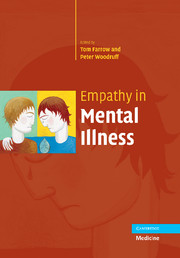Book contents
- Frontmatter
- Contents
- Foreword
- List of contributors
- Part I ‘Dysempathy’ in psychiatric samples
- Part II Empathy and related concepts in health
- Part III Empathy models, regulation and measurement of empathy
- 21 Balancing the empathy expense account: strategies for regulating empathic response
- 22 Empathic accuracy: measurement and potential clinical applications
- 23 A perception-action model for empathy
- 24 The Shared Manifold Hypothesis: embodied simulation and its role in empathy and social cognition
- 25 Using literature and the arts to develop empathy in medical students
- Index
21 - Balancing the empathy expense account: strategies for regulating empathic response
from Part III - Empathy models, regulation and measurement of empathy
Published online by Cambridge University Press: 17 August 2009
- Frontmatter
- Contents
- Foreword
- List of contributors
- Part I ‘Dysempathy’ in psychiatric samples
- Part II Empathy and related concepts in health
- Part III Empathy models, regulation and measurement of empathy
- 21 Balancing the empathy expense account: strategies for regulating empathic response
- 22 Empathic accuracy: measurement and potential clinical applications
- 23 A perception-action model for empathy
- 24 The Shared Manifold Hypothesis: embodied simulation and its role in empathy and social cognition
- 25 Using literature and the arts to develop empathy in medical students
- Index
Summary
Introduction
Is it good to be empathic? Even taking into account the wide spectrum of definitions associated with the term ‘empathy’, people are generally in favour of the concept. Psychological research and anecdotal evidence suggest that empathy is widely valued. Hogan's (1969) individual difference measure of empathy has items which suggest that high scorers are all-around good citizens in addition to being empathic (e.g. ‘I usually take an active part in the entertainment at parties’ and ‘Most of the arguments or quarrels I get into are over matters of principle’). When Norman (1967) rank-ordered traits in terms of social desirability, empathy was rated on average at 6.7 on a 9-point scale, where 9 was the highest desirability. Many of the chapters in this book (e.g. chapters 2, 8) point to deficits in empathy or the absence of empathy as being prominent features of serious psychological disorders and mental disabilities. Indeed, respect for empathy is so great that many criminals, particularly sex offenders (e.g. Pithers, 1994), have been enrolled in ‘empathy training’ programmes (albeit some based on inconclusive research findings) as a part of rehabilitation. It appears that the ability to respond empathically is highly sought after.
However, there can be too much of a good thing, and although it has been said that one can never be too rich or too thin, there do appear to be costs to being too empathic, as well as costs associated with the more common other extreme (not being empathic enough).
- Type
- Chapter
- Information
- Empathy in Mental Illness , pp. 389 - 407Publisher: Cambridge University PressPrint publication year: 2007
- 31
- Cited by



